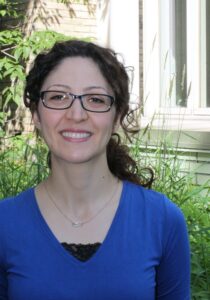
Prof. Fae Azhari, cross-appointed with CivMin and MIE, has received funding through the Connaught New Researcher awards for smart bridge decks.
Azhari relates her research:
Cracks, corrosion, and other defects are becoming an all too familiar sight in our aging concrete infrastructure. Concrete bridge decks are especially susceptible to deterioration due to ageing, chloride-induced corrosion, and traffic loading. Transportation agencies require careful periodic inspections of bridge decks, which not only is a difficult and time-consuming task, but may also miss critical damage due to the intermittent nature of these evaluations.
To perform timely and cost-effective maintenance and prevent any catastrophic failures, we need continuous monitoring of structural conditions. Would it not be nice if bridges had a skin that could sense traffic and surface conditions? This research aims to develop a cement-based composite material that can be applied to bridge decks as a skin-like overlay and provide real-time spatial mapping of loads and defects. The proposed cementitious sensing skin functions based on the principle of piezoresitivity, which means changes in loading conditions and material properties correspond to proportional changes in electrical resistivity.
Therefore, by measuring changes in resistivity of the “smart” deck, we can deduce the location and intensity of stresses and defects. Unlike conventional sensing devices, the physical and mechanical properties of cementitious composites are similar to those of the host structure so they can withstand mechanical and environmental conditions while doubling as a self-sensing material for strain and damage detection.
Originally announced via Engineering News
November 18, 2022 | Daily Commercial News by ConstructConnect
November 16, 2022 | The Walrus
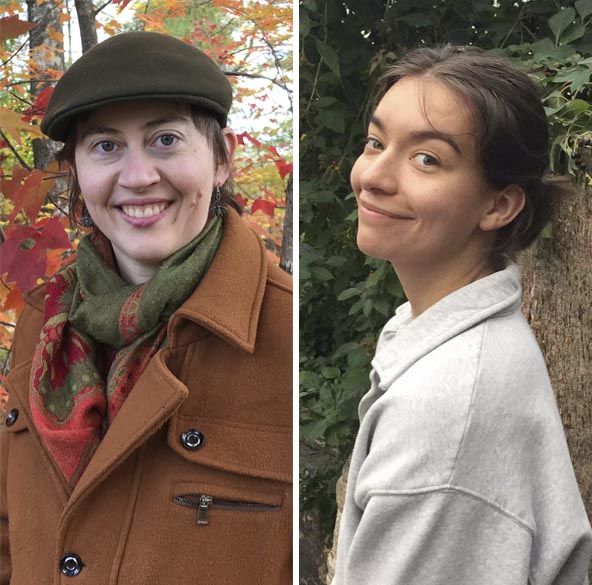
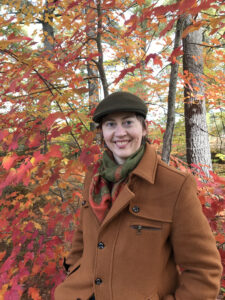
Jay Gordon (BSc 2011) – NSERC PGS Doctoral scholarship
Katia Ossetchkina (CivE 1T8 + PEY) – NSERC CGS Masters scholarship

November 17, 2022 | Forbes
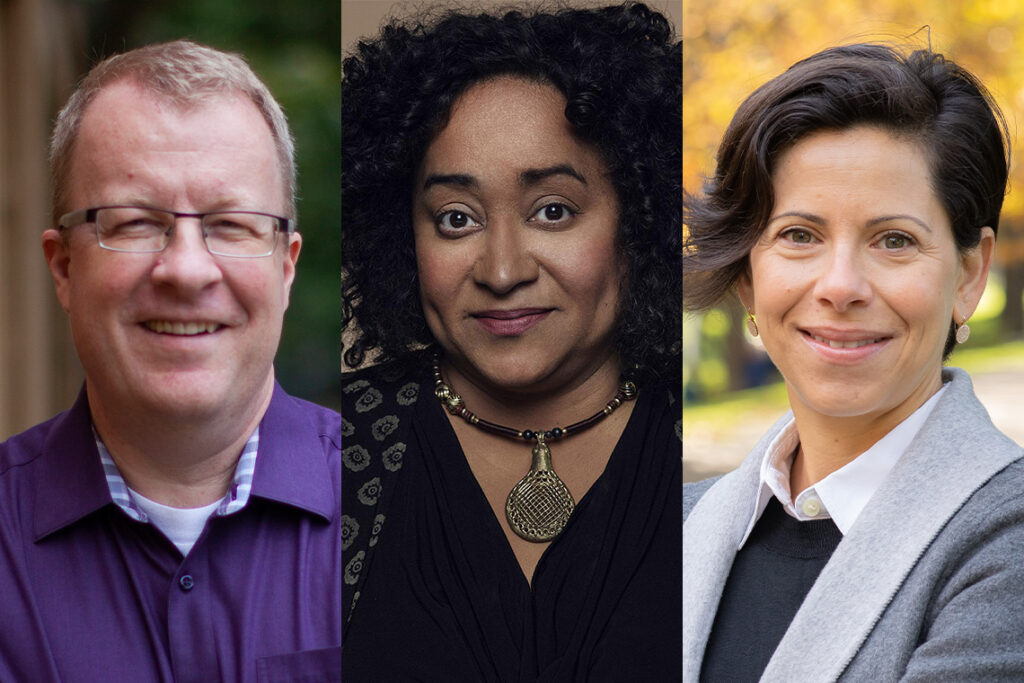
Congratulations to Prof. Marianne Hatzopoulou on being named a new Tier 1 Canada Research Chair in Transport Decarbonization and Air Quality.Hatzopoulou is a professor in the Department of Civil & Mineral Engineering, a director of Positive Zero Transport Futures, and leads the Transportation and Air Quality (TRAQ) research group.“She and her research team are enhancing our capacity to model air quality and environmental justice under decarbonization pathways and to develop new platforms to track human behaviour and air quality across communities and over time. Their findings will help industry, government and communities in Canada and around the world to prioritize transportation innovations that both benefit society and reduce emissions.” – excerpt from Government of Canada Canada Research Chairs website.
Here is the full list of new and renewed Canada Research Chairs at U of T:
New Canada Research Chairs
Aimy Bazylak in the department of mechanical and industrial engineering in the Faculty of Applied Science & Engineering, Tier 1 in clean energy.
Denise Belsham in the department of physiology in the Temerty Faculty of Medicine, Tier 1 in neuroendocrinology.
Maged Goubran at the Sunnybrook Health Science Centre and the department of medical biophysics in the Temerty Faculty of Medicine, Tier 2 in artificial intelligence and computational neuroscience.
Scott Gray-Owen in the department of molecular genetics in the Temerty Faculty of Medicine, Tier 1 in infectious immunopathogenesis.
Robin Hayeems at the Hospital for Sick Children and the Institute of Health Policy, Management and Evaluation in the Dalla Lana School of Public Health, Tier 2 in genomics and health policy.
Marianne Hatzopoulou in the department of civil and mineral engineering in the Faculty of Applied Science & Engineering, Tier 1 in transport decarbonization and air quality.
Caroline Hossein in the department of global development studies at U of T Scarborough, Tier 2 in Africana development and feminist political economy.
Muhammad Husain at the Centre for Addiction and Mental Health and the department of psychiatry in the Temerty Faculty of Medicine, Tier 2 in treatment innovation in mood disorders.
Courtney Jones at the University Health Network and the department of medical biophysics in the Temerty Faculty of Medicine, Tier 2 in leukemia stem cell metabolism.
Andrea Knight at the Hospital for Sick Children and the department of paediatrics in the Temerty Faculty of Medicine, Tier 2 in mental health and chronic disease of childhood.
Sushant Kumar at the University Health Network and the department of medical biophysics in the Temerty Faculty of Medicine, Tier 2 in genomic medicine.
J. Rafael Montenegro Burke in the Donnelly Centre in the Temerty Faculty of Medicine, Tier 2 in functional metabolomics and lipidomics.
Deborah O’Connor in the department of nutritional sciences in the Temerty Faculty of Medicine, Tier 1 in human milk and infant nutrition.
Vijay Ramaswamy at the Hospital for Sick Children and the department of paediatrics in the Temerty Faculty of Medicine, Tier 2 in pediatric neuro-oncology.
Gregory Schwartz at the University Health Network and the department of medical biophysics in the Temerty Faculty of Medicine, Tier 2 in bioinformatics and computational Biology.
Jay Shaw in the department of physical therapy in the Temerty Faculty of Medicine, Tier 2 in responsible health innovation.
Anastasia Tikhonova at the University Health Network and the department of medical biophysics in the Temerty Faculty of Medicine, Tier 2 in stem cell niche biology.
Burton Yang at Sunnybrook Health Sciences Centre and the department of laboratory medicine and pathobiology in the Temerty Faculty of Medicine, Tier 1 in cardiac remodeling.
Darren Yuen at Unity Health Toronto and the department of medicine in the Temerty Faculty of Medicine, Tier 2 in fibrotic injury.
Renewed Canada Research Chairs
John Calarco in the department of cell and systems biology in the Faculty of Arts & Science, Tier 2 in neuronal RNA biology.
Myron Cybulsky at the University Health Network and the department of laboratory medicine and pathobiology in the Temerty Faculty of Medicine, Tier 1 in arterial wall biology and atherogenesis.
David Duvenaud in the department of computer science in the Faculty of Arts & Science, Tier 2 in generative models.
Julie Forman-Kay in the Hospital for Sick Children and the department of biochemistry in the Temerty Faculty of Medicine, Tier 1 in intrinsically disordered proteins.
Bryan Gaensler in the David A. Dunlap department of astronomy and astrophysics in the Faculty of Arts & Science, Tier 1 in radio astronomy.
Alec Jacobson in the department of computer science in the Faculty of Arts & Science, Tier 2 in geometry processing.
Jean-Philippe Julien at the Hospital for Sick Children and the department of biochemistry in the Temerty Faculty of Medicine, Tier 2 in structural immunology.
Kang Lee in the department of applied psychology and human development at the Ontario Institute for Studies in Education, Tier 1 in moral development and developmental neuroscience.
David Levin in the department of computer science in the Faculty of Arts & Science, Tier 2 in simulation-driven graphics and fabrication.
Jed Meltzer at Baycrest Hospital and the department of psychology in the Faculty of Arts & Science, Tier 2 in interventional cognitive neuroscience.
Sean Mills in the department of history in the Faculty of Arts & Science, Tier 2 in Canadian and transnational history.
Kimberly Pernell-Gallagher in the department of sociology in the Faculty of Arts & Science, Tier 2 in economic sociology.
Arun Ramchandran in the department of chemical engineering and applied chemistry in the Faculty of Applied Science & Engineering, Tier 2 in engineered soft materials and interfaces.
Andras Tilcsik at the Rotman School of Management, Tier 2 in strategy, organizations, and society.
Haley Wyatt in the department of biochemistry in the Temerty Faculty of Medicine, Tier 2 in mechanisms of genome instability.
By Scott Anderson
This story originally posted by U of T News
November 14, 2022 | Grounded Engineering
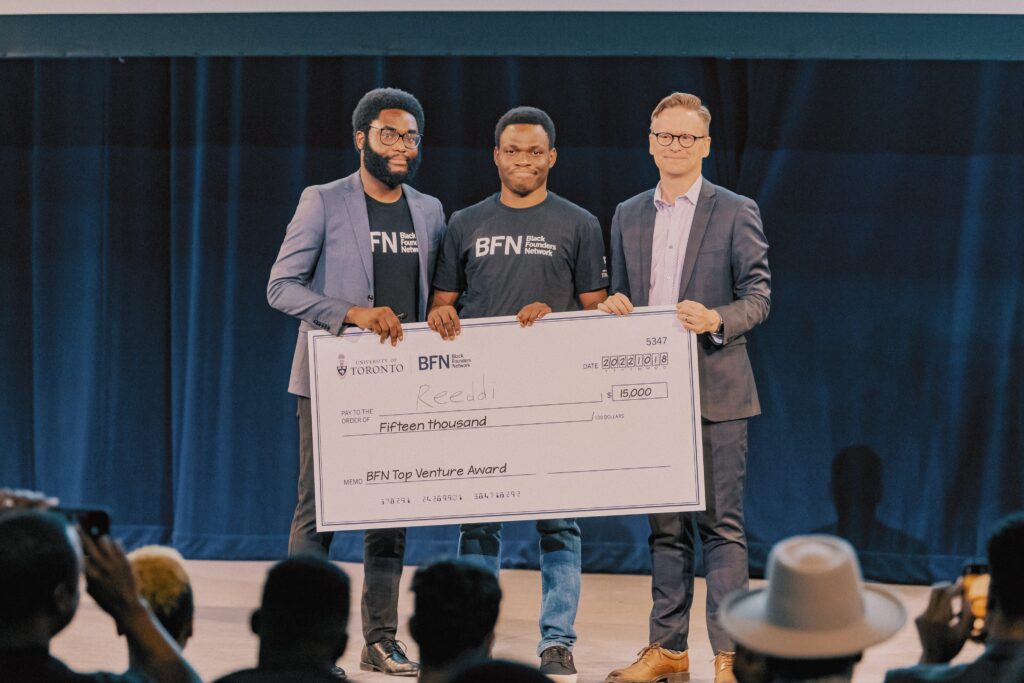
Congratulations to our CivMin alumni Olugbenga Olubanjo (CivE MASc 1T9) for taking home the top Venture Award prize at the Black Founders Network (BFN). The event was held November 9, 2022 at the University of Toronto.
Olugbenaga Olubanji is a founder of an energy startup Reeddi that completed the BFN Accelerate’s four-month bootcamp among eleven others. “What brought me to the BFN was the community of like-minded founders all working to build amazing things,” said Olugbenga. He took the first place BFN Top Venture Award and awarded with a $15,000 grant by the BFN Investor Judges.
Reeddi developed a portable source of affordable and clean electricity suitable both for personal and businesses needs in energy-poor regions of the world. The company provides rentals of compact and portable capsules charged by solar-powered stations located in communities. The companies’ business model provides affordable energy tool for customers and motivates them to return capsules on time by earning credits toward future purchases.
BFN as a part of U of T works to create an inclusive community for Black entrepreneurs. It is aimed to support impactful startups and founders as they launch, fund and scale businesses.
This story was originally published by U of T News.
November 9, 2022 | TVO Today
November 5, 2022 | The Globe and Mail